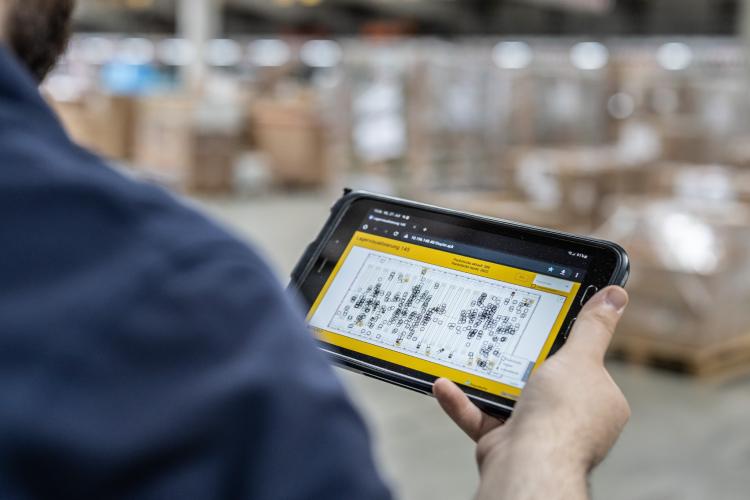Dachser and Fraunhofer IML receive the German Logistics Award
With its digital twin @ILO, Dachser and Fraunhofer IML create full transparency for packages, products and workflows at transit terminals while shortening processing times. Successive implementations in Dachser offices in Europe will begin in 2024.
Asociación Alemana de LGerman Logistics Association (BVL) has awarded the German Logistics Prize 2023 to Dachser and the Fraunhofer Institute IML for the “digital twin @ILO (Advanced Indoor Localization and Operations)” project. This technology, which has already been tested in two branches, automatically and continuously creates and updates a “digital twin” of all packages, products and workflows in a transit terminal. The use of this technological tool allows employees to access all the information presented in a simple and intuitive way on their mobile devices and screens.
The @ILO digital twin increases transparency in warehouse processes and optimizes individual work steps. The application benefits not only logistics workers in the warehouse and drivers but also customers, who in the future will be able to receive more accurate information about their shipments. It is noteworthy that the @ILO digital twin is the most significant materialization of more than six years of joint research carried out in the DACHSER Enterprise Lab. It is precisely in this laboratory where the multinational's experts work with researchers from the Fraunhofer Institute for Flow of Flow. Materials and IML Logistics with the aim of developing truly innovative solutions.
"We are investing in joint research with Fraunhofer IML to drive digitalization in logistics and continue to improve the quality of the services we offer to our customers," explained Burkhard Eling, CEO of Dachser, during the awards ceremony in Berlin. . He added: “The fact that this collaborative work has led to an innovation that has impressed the jury of the German Logistics Award validates our effort and gives us an additional boost of motivation.”
Dachser now plans to take the next step in the development of this innovation and aims to systematically implement the new technology in its European delegations from 2024. “As a crucial milestone in our digital transformation, the @ILO digital twin represents a decisive advance in groupage logistics,” says Eling.
AI and automation are on the rise
The special AI-based algorithms of the @ILO software interpret the data collected every second by hundreds of optical scanning units located on the roof of the terminal. Using this data, they automatically and immediately identify and locate all packages.
Fully integrated into workflows, this technological innovation has already proven itself in @ILO pilot transit terminals in the German branches of Unterschleißheim near Munich and Öhringen near Heilbronn. Specifically, the management of some processes carried out between the entry and exit of goods was carried out between 15% and 35% faster, thanks to the elimination of tasks such as manual barcode scanning or daily manual inventory . As a result, (short-haul) distribution vehicles can begin making deliveries earlier in the day, allowing drivers to avoid morning rush hour traffic.
“By using automation and artificial intelligence technologies in groupage handling, we can offer high quality and still meet complex customer requirements. It also helps us overcome the challenges arising from the shortage of space and skilled workers,” explains Alexander Tonn, COO Road Logistics at Dachser. “New technologies provide the real-time data we need. But technology really starts to add value when it relieves and supports employees in their daily work, and @ILO has impressively demonstrated in pilot branches that it can do just that.”
Next innovative step: AI-assisted charging
Stefan Hohm, Chief Development Officer at Dachser, is well aware of the future potential of @ILO: “The continuous and fully automated measurement of all packages represents the next step towards Logistics 4.0, a step that we will take together with Fraunhofer IML within the framework of our research collaboration.” “During pilot operations, the system was able to determine the length, height and width of packages with great precision and provide that information in real time. As soon as the system is fully operational, the data obtained about each package can be fed into intelligent algorithms to, for example, assist with loading and route planning, and to further increase the capacity utilization of swap bodies, trailers , and short distance transport vehicles. "This reduces both transport kilometers and CO2 emissions," he adds. Additionally, Dachser and Fraunhofer IML are currently developing an optimized @ILO system that customers can use to improve their shipping areas to increase distribution transparency. "But there is still a lot of research to be done in that regard," concludes Hohm.

